On 25 October 2024, within the Justice Reform Monitoring in Armenia project (#JUREMONIA www.juremonia.am) funded by the European Union, Eurasia International University launched the annual International Roundtable on Access to Justice. The date of the event was chosen symbolically, as 25 October is celebrated at the European Day of Justice upon the joint initiative of the Council of Europe and the European Commission. As an annual event, the Roundtable aims at providing a forum for an open discussion and multidimensional interdisciplinary dialogues between practitioners, civil society and the academia on topical issues of justice and the Rule of Law.The inaugural roundtable 2024 was devoted to the presentation of the newly designed modular program in Access to Justice. The concept of the program presupposes providing participants with interdisciplinary up-to-date knowledge, developing hard and soft skills, as well as following innovative approaches in legal profession and beyond.
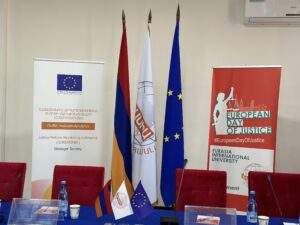
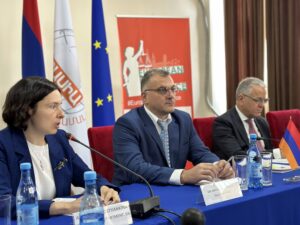
Reflecting the interdisciplinary approach and aiming at the mapping out the wide field of the access to justice topic, the inaugural Roundtable 2024 had three major focuses:
(1) International and European Law and access to justice;
(2) interdisciplinary issues related to the access to justice from other-than-law perspectives, and
(3) access to justice and legal education.
The event commenced with a welcome address from EIU Rector Prof. Dr. Suren Ohanyan, followed by the opening speech by His Excellency Ambassador Vassilis Maragos, Head of the EU Delegation to Armenia. In his opening remarks, H.E. Ambassador Maragos underlined that Justice Sector Reform remains in the focus of the EU-Armenia cooperation and touched upon a wide range of important issues signalling the complexity of the access to justice topic. In particular, the Ambassador underlined the importance of access to the legal profession on the basis of solid procedures (as a prerequisite of the access to justice), the vital importance of professional capacity-building and legal education in correspondence with highest standards and fundamental principles, paid attention to the challenges related to the emerging areas of legal regulation (such as environment, personal data protection, and AI), and highlighted the importance of a citizen-centred justice. He also stated that for the building of a robust, transparent and accountable justice system it is necessary to develop an open and effective dialogue between policymakers, civil society and the academia.
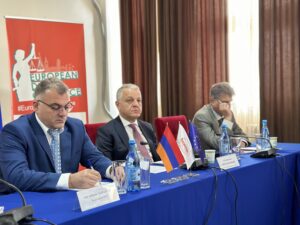
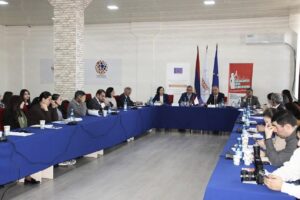
The roundtable discussion’s participants were welcomed by Mr. Arshak Gasparyan, President of the NGO “Social Justice,” which is a part of the JUREMONIA project consortium. He also gave a presentation on the JUREMONIA project, including its functions and the characteristics of the academic MAJust sub-grant that the EIU is implementing, among other sub-grants that have been awarded. A. Gasparyan underlined how its objectives align with those of the JUREMONIA project and reiterated the value and reciprocal advantages of the relationship between academia and civil society in order to track ongoing judicial reforms and bolster the ability to support and encourage access to justice.
The panels were organized in the format of expert discussions moderated by the academic coordinator of MAJust Program Dr. Anna Khvorostiankina.
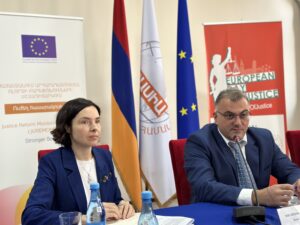
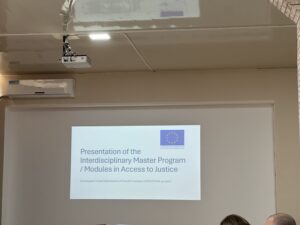
The first panel was opened by Ms. Lusine Hakobyan, a Co-president of the CEPA-based EU-Armenia Civil Society Platform and Founder and President of the Europe in Law Association. Ms. Hakobyan provided an overview of the justice sector reforms in Armenia, their achievements and failures as seen by the civil society. Underlying the vital importance of the strengthening of the Rule of Law for the proper implementation of the EU-Armenia CEPA and Europeanization of the domestic legal system, she identified the major challenges and problems in the processes of reform implementation, including the issues of proper policymaking, needs analysis and strategic prioritization, the (in)effectiveness of monitoring and evaluation in the policy cycle and the importance of further building of the monitoring and participatory capacity of the civil society. She further highlighted the potential of the strong partnership between the civil society and academia.
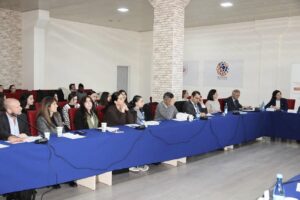
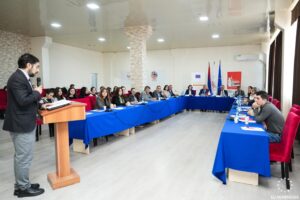
Mr. Igor Mirzakhanyan, International Humanitarian and International Human Rights Law expert, the co-founder of the Association of International Law of Armenia reflected on the current issues of access to justice at the international level. He underlined the importance of introducing future professionals not only to classical instruments of human rights protection (such as the European Convention on Human Rights) but also exploring a wider range of tools and mechanisms available in international law.
For the organizers of the Roundtable, it was an honour to host Mr. Josh Ounsted, an international expert of the Raoul Wallenberg Institute, Head of thematic area of the Access to Justice. Mr. Ounsted’s participation allowed delving into the role of Development Studies in the comprehensive and multidimensional analysis of the access to justice issues, especially from the policymaking perspective and in the light of development actors support to justice reforms worldwide.
The second panel focused on the interdisciplinary aspects of access to justice. It was rich in insights and innovative discussion topics, as it shed the light on how the understanding of the access to justice can benefit from the contributions from other fields of knowledge, in particular, Social Sciences, Political Science, Environmental Sciences, and Medicine.
In the first presentation, Prof. Dr. Dr. h.c. Thomas Kruessmann, a prominent criminal law and legal education expert, discussed the complex and multilayered problem of access to justice in cases of domestic violence. He demonstrated the deep intertwining of the issues of psychology, sociology, cultural studies on the one hand and international law, criminal law and procedure, and criminalistics on the other.
Dr. Gayane Atoyan, an internationally recognized expert of Environmental Law, Environmental Impact Assessment and Strategic Environmental Assessment, discussed the concept of environmental justice and the issues of access to justice in environmental law cases. She stressed that environmental and climate litigation is a growing field of professional legal expertise requiring strong and multidisciplinary skills from the future lawyers.
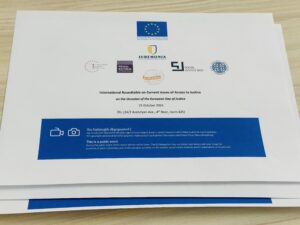

Dr. Valentina Gevorgyan, a political scientist, researcher and university lecturer, highlighted the relevance of Political Science in researching and teaching of the Access to Justice and, more generally, the importance of development of strategic policy thinking and deep understanding of the reform processes, especially in the areas requiring behavioral change. She stressed that Political Science provides proper methodological and analytical toolkit that is indispensable for both policymaking in the field of access to justice by the governmental agencies and effective monitoring of the reform implementation by the civil society.
Last but not least, Dr. Anna Hovhannisyan (European Licensed Clinical Laboratory Geneticist, Founder and Head of Molecular Genetic Laboratory, Genetic Forensic Center LLC) revealed the almost unexplored field of interconnections between genetics and the issues of access to justice. Stressing the lack of professional experts in forensic genetics and legal professionals aware of the genetics toolkit, she underlined the importance of cross-disciplinary cooperation in practice and academia.
The Roundtable culminated in the in-house workshop for lecturers with the focus on innovative interactive teaching methods aiming at the developing of professional skills of future lawyers and the role of academia in ensuring access to justice by providing pro bono legal aid. It was underlined that it is not possible to achieve access to justice without relevant, up-to-date and high-quality legal education.
The contributions of the key speakers provoked lively discussions that not only addressed practical problems of access to justice but also stimulated in-depth thinking about philosophical foundations of law, particularities of legal mentality and legal thinking and the impact of the soviet-times radical dogmatic positivism on legal practice and scholarship, specificities of legal argumentation, the quality of legislative regulation and the problem of “lawlessness” in law, as well as the mission and ethical standards of legal profession.
Importantly, the ideas expressed and developed at the Roundtable are integrated into the MAJust program. Starting from 2025, the program will be piloted on the modular basis in the format of short intensive certificate-based courses open to the public.



